|
|
|
Sort Order |
|
|
|
Items / Page
|
|
|
|
|
|
|
| Srl | Item |
| 1 |
ID:
130309
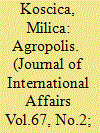

|
|
|
|
|
| Publication |
2014.
|
| Summary/Abstract |
Over fifty percent of the world's population is urbanized-living in cities- and cities almost entirely depend on imported food to meet daily needs. Different factors such as population growth, urbanization and increasing global demand for food are intensifying; urban agriculture is an important tool for enhancing food security in response to the food related restraints faced by city dwellers. Through a historical retrospective of urban agriculture to an analysis of current practices and policies, these article explores urban agriculture's potential ability to manage the lack of land and water in cities through the development of innovate growing techniques that optimize the access, quality, and quality of foods for millions of people in developing cities around the globe.
|
|
|
|
|
|
|
|
|
|
|
|
|
|
|
|
| 2 |
ID:
130681
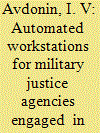

|
|
|
|
|
| Publication |
2014.
|
| Summary/Abstract |
The article examines trends in workstation use by military investigators engaged in crime detection and investigation. It explored algorithms to maximize automated workstations (AWS) potential in the work of detecting and investigating crimes. Trends in using AWS discussed include legal information systems used by the U.S., Great Britain, and Italy as well as software programs and sharing of electronic documents by investigator, head of the agency, prosecutor and the expert.
|
|
|
|
|
|
|
|
|
|
|
|
|
|
|
|
| 3 |
ID:
132116
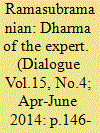

|
|
|
|
|
| Publication |
2014.
|
| Summary/Abstract |
The advent and domination of modern technology today extends from our daily domestic use all the way to national defence and international communications.
However, whenever the questions are posed about the modern technology such as the nuclear power plant in Koodankulam or the introduction of genetically modified crops, we find that even the best among us don't have a framework or approach that is clear and easy to understand. Question such as: what is the limit to the usage of modern technology? How do we measure its benefits as against its harms? And more importantly, when to reject modern technology? Are not always eliciting a clear response from intellectuals, leaders and even scientist and technocrats. We find that they are unable to balance their professional interest against the common interest for humanity.
|
|
|
|
|
|
|
|
|
|
|
|
|
|
|
|
| 4 |
ID:
129232
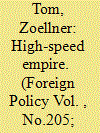

|
|
|
|
|
| Publication |
2014.
|
| Summary/Abstract |
Chinese rail is sprawling, modern, and elegant. It's also convoluted, corroding, and financially alarming. Wanna take a ride? THE BULLET TRAIN hurtles toward the industrial city of Taiyuan in northern China, and seemingly within seconds, the modern, smog-soaked Beijing skyline gives way to open fields. David Su is munching on pistachios in the bar car, careful that not a crumb hits his blue foulard scarf, as he heads some 320 miles to reach his early-morning appointment for a private equity firm. Over his shoulder, the Chinese countryside is a disembodied blur: farms and factories receding at the mind-aching speed of 186 miles per hour. Cars on a nearby highway seem to be creeping along by comparison. Su travels frequently for his job at Global Capital Investments Group, and he likes this new high-speed train, zipping along on one of several dozen lines built by the Chinese government in a decade-long blitzkrieg program that now has a price tag of $500 billion.
|
|
|
|
|
|
|
|
|
|
|
|
|
|
|
|
| 5 |
ID:
128119
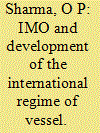

|
|
|
|
|
| Publication |
2013.
|
| Summary/Abstract |
It is evident that the famous English poet, Samuel Taylor Coleridge had a premonition about the fate of the ocean in the closing years of the twentieth century. Marine pollution is very much a product of modern technology. Recognizing marine pollution as a problem of global dimension is of relatively recent origin
|
|
|
|
|
|
|
|
|
|
|
|
|
|
|
|
| 6 |
ID:
094068
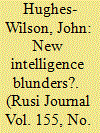

|
|
|
|
|
| Publication |
2010.
|
| Summary/Abstract |
Good intelligence relies on accuracy, probity and independence. In the current time of global terrorist threats, intelligence is more vital - and visible - than ever in protecting the public and national interest. But collection and analysis of information is fraught with difficulty. Even modern technology throws up as many problems as it solves by inundating operatives with a tsunami of information. Yet examination of the two main blunders of the last decade show that it is the human element that, as ever, is the weakest link in the intelligence chain.
|
|
|
|
|
|
|
|
|
|
|
|
|
|
|
|
| 7 |
ID:
137564
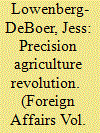

|
|
|
|
|
| Summary/Abstract |
Thousands of years ago, agriculture began as a highly site-specific activity. The first farmers were gardeners who nurtured individual plants, and they sought out the microclimates and patches of soil that favored those plants. But as farmers acquired scientific knowledge and mechanical expertise, they enlarged their plots, using standardized approaches—plowing the soil, spreading animal manure as fertilizer, rotating the crops from year to year—to boost crop yields. Over the years, they developed better methods of preparing the soil and protecting plants from insects and, eventually, machines to reduce the labor required. Starting in the nineteenth century, scientists invented chemical pesticides and used newly discovered genetic principles to select for more productive plants. Even though these methods maximized overall productivity, they led some areas within fields to underperform. Nonetheless, yields rose to once-unimaginable levels: for some crops, they increased tenfold from the nineteenth century to the present.
|
|
|
|
|
|
|
|
|
|
|
|
|
|
|
|
| 8 |
ID:
079052
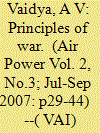

|
|
|
| 9 |
ID:
118912
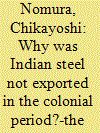

|
|
|
|
|
| Publication |
2012.
|
| Summary/Abstract |
While various scholars of Indian economic history have focused on the progress of import substitution in India after the 1920s, few have studied why this led to hardly any export of industrial products during the colonial period. One of the most probable reasons for the lesser popularity of this issue could be attributed to a commonly shared view that there was less hope for the export of industrial products in colonial India since import substitution had progressed only so far. Although it is accepted that the industrial development of colonial India was generally stagnant, this does not necessarily apply to specific products in specific industries. For instance, the iron and steel industry achieved almost a full self-sufficiency rate for some of its steel products during the 1920s, although the industry hardly exported the products afterward. This paper aims to clarify why hardly any steel of the Tata Iron and Steel Company (TISCO), the only steel producing company with modern technology until the mid-1930s, was exported. A detailed study of the company's archives will show that the steel export of the company was fundamentally hindered by a fact which had its origin in British imperial policy: the strict quality specifications in the production of steel.
|
|
|
|
|
|
|
|
|
|
|
|
|
|
|
|
|
|
|
|
|